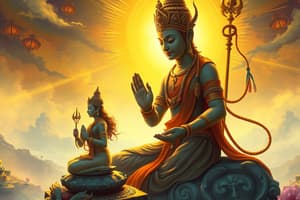Podcast
Questions and Answers
Buddhism originated in Japan.
Buddhism originated in Japan.
False (B)
Siddhartha was born around 563 CE.
Siddhartha was born around 563 CE.
False (B)
The Buddha achieved enlightenment while meditating under a banyan tree.
The Buddha achieved enlightenment while meditating under a banyan tree.
False (B)
Buddhism places a significant emphasis on rituals and sacred texts from Hinduism.
Buddhism places a significant emphasis on rituals and sacred texts from Hinduism.
Buddhism introduced itself during a time of social and political stability in India.
Buddhism introduced itself during a time of social and political stability in India.
Siddhartha was a prince belonging to the merchant caste.
Siddhartha was a prince belonging to the merchant caste.
The Middle Way was a teaching that Siddhartha emphasized for 45 days.
The Middle Way was a teaching that Siddhartha emphasized for 45 days.
The concept of nirvana in Buddhism describes a state of craving and desire.
The concept of nirvana in Buddhism describes a state of craving and desire.
Siddhartha initially sought teachings from the Upanishads for six years.
Siddhartha initially sought teachings from the Upanishads for six years.
Buddhism focuses primarily on the concept of the divine.
Buddhism focuses primarily on the concept of the divine.
Flashcards are hidden until you start studying
Study Notes
Origin and Influence
- Buddhism originated in India during the 6th century BCE amidst significant social and political transformation.
- Hinduism, the predominant religion at the time, greatly influenced the emergence of Buddhism.
Key Philosophies
- Focus on self-discovery without a divine concept, emphasizing an anthropocentric rather than theocentric worldview.
- Minimal reliance on Hindu practices, rituals, and sacred texts.
Historical Context
- India experienced the formation of kingdoms, urban expansion, and thriving trade routes, challenging traditional village life.
- These societal changes created a backdrop for the introduction of Buddhism.
Siddhartha Gautama (Buddha)
- Siddhartha, born around 563 BCE in present-day Nepal, was a prince from the warrior caste.
- His destiny was a choice between becoming a great political leader or a renounced monk.
- Insightful realization about the prevalence of human suffering overshadowing happiness led him to seek deeper truths.
Spiritual Journey
- For six years, Siddhartha practiced meditation based on the teachings of the Upanishads.
- Achieved enlightenment under the Bodhi tree in Bodh Gaya, discovering the nature of suffering, aging, and death.
Enlightenment and Teachings
- Siddhartha, now the Buddha ("the enlightened one"), attained nirvana, marked by the absence of craving.
- Dedicated 45 years to sharing his insights, advocating the Middle Way as a balanced approach to life.
- His final directive to followers: “Work out your own liberation with diligence,” emphasizing personal responsibility in the pursuit of enlightenment.
Studying That Suits You
Use AI to generate personalized quizzes and flashcards to suit your learning preferences.





